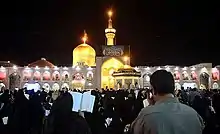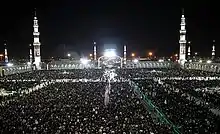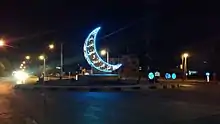Qadr Night
Laylat al-Qadr (Arabic: لیلة القدر), variously rendered in English as the Night of Decree,[2] Night of Power,[3] Night of Value, Night of Destiny,[4] or Night of Measures, is, in Islamic belief, the night when the Quran was first sent down from Heaven to the world and also the night when the first verses of the Quran were revealed to the prophet Muhammad.[5] According to many Muslim sources, it was one of the odd-numbered nights of the last ten days of Ramadan, the ninth month of the Islamic calendar. Since that time, Muslims have regarded the last ten nights of Ramadan as being especially blessed. Muslims believe that the Night of Qadr comes with blessings and mercy of God in abundance, sins are forgiven, supplications are accepted, and that the annual decree is revealed to the angels who carry it out according to God's plan.
| Laylat al-Qadr | |
|---|---|
| Official name | ليلة القدر |
| Also called | Night of Power, Night of Value, Night of Destiny, Night of Determination, or Precious Night [1] |
| Observed by | Muslims |
| Significance | The night the Quran was revealed to the Prophet Muhammad; angels descend to the earth and the annual decree is revealed to them |
| Observances | Tahajjud night prayers, reading the Quran, making dua, doing dhikr, observing iʿtikāf |
| Date | Historically, 23 Ramadan (in the ancient (intercalated) Arabic calendar) (13/14 December AD 610). Sunnis observe the 27th. |
 |
| Part of a series on |
| Islamic culture |
|---|
| Architecture |
| Art |
| Clothing |
| Holidays |
| Literature |
| Music |
| Theatre |
|
Revelation to Muhammad
Some commentators believe that the Quran was revealed to Muhammad twice;
- the 'immediate revelation' happening on the Laylat al-Qadr and
- 'gradual revelation' across 23 years.
The Quran uses the word anzal (انزل) which justifies 'the immediate revelation', according to Allamah Tabatabai.[6] However some others believe that the revelation of Quran occurred in two phases, with the first phase being the revelation in its entirety on Laylat al-Qadr to the angel Gabriel (Jibril in Arabic) in the lowest heaven, and then the subsequent verse-by-verse revelation to Muhammad by Gabriel.[4] The revelation started in 610 CE at the Hira cave on Mount Jabal al-Nour in Mecca. The first Surah that was revealed was Sūrat al-ʿAlaq (in Arabic العلق).[7] During the first revelation the first five verses of this Surah, or chapter, were revealed.[8]
Date
The specific date of Laylat al-Qadr is not mentioned in the Quran.[9][10] This is because Muhammad received the information about the exact date of Laylat al-Qadr from God in a dream. He went to tell the Sahabah about that date. However, he saw two people fighting and forgot what the date was because Allah took the knowledge of Al Qadr from him.[11] With the day of the week, a Muslim date can be fixed exactly. Ibn Abbas was aware of both the date and the day of the week.[12][13][14] Hence the Shia's have generally concluded that it is the 23rd (see below).[4]
Sunni Islam
Sunni Islam holds that God alone answers humanity's supplications and that He alone receives them and forgives humanity and gives them what they ask for, and that on this particular night Muslims should actively seek God's forgiveness and engage in various acts of worship.
In Islamic countries and Sunni communities all over the world, Laylat al-Qadr is found to be on the last 5 odd nights of Ramadan (21st, 23rd, 25th, 27th or 29th) whereby night precedes day. Many traditions insist particularly on the night before the 27th of Ramadan.[15][16][17]
| 27th of Ramadan | Gregorian date[18] |
|---|---|
| 1440 | 1 June 2019 |
| 1441 | 20 May 2020 |
| 1442 | 9 May 2021 |
| 1443 | 28 April 2022 |
| 1444 | 18 April 2023 |
Shia Islam


Shia Muslims similarly believe that Laylat al-Qadr is to be found in the last ten odd nights of Ramadan but mostly on the 19th, 21st or 23rd of Ramadan with 23rd being the most important night.[19] The 19th, according to the Shia belief, coincides with the night Ali was attacked in the Mihrab while worshipping in the Great Mosque of Kufa. He died on 21 Ramadan.[20]
| 23rd of Ramadan | Gregorian date |
|---|---|
| 1436 | 10 July 2015 |
| 1437 | 27 June 2016[21] |
| 1438 | 18 June 2017[22] |
| 1439 | 8 June 2018[23] |
| 1440 | 28 May 2019[24][25] |
| 1441 | 16 May 2020[26] |
Religious importance
The night is not comparable to any others in view of Muslims[19] and according to a tradition, the blessings due to the acts of worship during this night cannot be equaled even by worshipping throughout an entire lifetime. The reward of acts of worship done in this one single night is more than the reward of around 83 years (1000 months) of worship.[27] Laylat al-Qadr is referenced in the Quran:[4][19]
- We have indeed revealed this (Message) in the Night of Decree:
- And what will explain to thee what the Night of Decree is?
- The Night of Decree is better than a thousand months.
- Therein come down the angels and the Spirit by Allah's permission, on every errand:
- Peace!... This until the rise of dawn!
Shia Muslims believe that Ali (the first Shia Imam, and the fourth caliph of the Rashidun Caliphate to Sunnis) had special insight and intimacy with Allah on this night. Imam Sadiq is quoted as saying (Tafsir "al-Burhan", vol. 4, p. 487):
Once Imam Ali was reciting Surat al-Qadr and his sons, Imam Hasan (a) and Imam Husayn (a) were near him. Imam Husayn (a) asked his father: “Father, how come we feel a different sensation when you recite this surah?” Imam Ali(a) replied, “O son of the Prophet and my son! I know things from this chapter that you are not aware of now. When this surah was sent down to the Prophet he asked me to go to him. When I went to him he recited this surah, then he put his hand on my right shoulder and said: O my brother and my successor! O the leader of my nation after me! O tireless fighter with my enemies! This surah is yours after me, and is for your two sons after you. Gabriel who is my brother among the angels informs me of the events of one year of my nation at the night of Qadr. And after me he will give this information to you. This surah will always have a shining light in your heart and in the heart of your successors until the rising of the dawn of the day of reappearance of Qa'im [the one who rises, a title for the Islamic Messiah, Mahdi]."[29]
See also
- Predestination in Islam (Qadar)
- Glossary of Islam
- Islamic calendar
- Muslim holidays
References
- Britannica Guide to the Islamic World. Encyclopaedia Britannica, Inc. 2009. ISBN 9781593398491. Retrieved 2 June 2017.
- Halim, Fachrizal A. (2014). Legal Authority in Premodern Islam: Yahya B Sharaf Al-Nawawi in the Shafi'i School of Law. Routledge. p. 15. ISBN 9781317749189. Archived from the original on 4 November 2020. Retrieved 31 May 2017.
- Daneshgar, Majid; Saleh, Walid A (eds) (2017). Islamic Studies Today: Essays in Honor of Andrew Rippin. Leiden. p. 93. ISBN 9789004337121. Archived from the original on 4 March 2020. Retrieved 31 May 2017.CS1 maint: extra text: authors list (link)
- A. Beverley, James (2011). "Laylat al-Qadr". In Melton, J. Gordon (ed.). Religious Celebrations: An Encyclopedia of Holidays, Festivals, Solemn Observances, and Spiritual Commemorations [2 volumes]: An Encyclopedia of Holidays, Festivals, Solemn Observances, and Spiritual Commemorations. Volume two L-Z. Santa Barbara, CA: ABC-CLIO. p. 517. ISBN 9781598842067. Archived from the original on 4 November 2020. Retrieved 31 May 2017.
- Sahih al-Bukhari. "Book of Revelation - Sayings and Teachings of Prophet Muhammad (صلى الله عليه و سلم)". As-Sunnah Foundation of America. Archived from the original on 24 May 2020. Retrieved 21 March 2020.
- Staff. "Qadr night from the view point of Allamah Tabtabaei". Allamah Tabtabaei University. Archived from the original on 3 July 2016. Retrieved 12 June 2016.
- al-Mubarakpuri, Safi-ur-Rahman (2002). The Sealed Nectar. Riyadh: Dar-us-Salam. p. 68. ISBN 978-1591440710.
- Roslan Abdul-Rahim (December 2017). "Demythologizing the Qur'an Rethinking Revelation Through Naskh al-Qur'an" (PDF). Global Journal Al-Thaqafah (GJAT). 7 (2): 62–3. doi:10.7187/GJAT122017-2. ISSN 2232-0474. Archived (PDF) from the original on 14 February 2019. Retrieved 26 February 2019.
- Islam and state in Sumatra: a study of seventeenth-century Aceh. p. 128.
- Marjo Buitelaar. Fasting and feasting in Morocco: women's participation in ramzan. p. 64.
- Sahih Bukhari. "Chapter: 2, Belief. Hadith No. 47". Archived from the original on 2 June 2020. Retrieved 10 May 2020.
- Sahih Bukhari. "Chapter: 32, Night prayer in Ramadan (Taraweeh). Hadith No: 239". Archived from the original on 3 June 2020. Retrieved 10 May 2020.
Ibn Abbas added "Search for it on the twenty-fourth (of Ramadan)"
- Bombay Tract and Book Society (1856). Life of Mohammad. Bombay. p. 30. Archived from the original on 4 November 2020. Retrieved 12 September 2020. Note that in Islam night precedes day, so that, for example, "the night of the 23rd" is not the night between the 23rd and the 24th but the night between the 22nd and the 23rd.
- Ibn Kathir (trans. Professor Trevor Le Gassick). The life of the Prophet Muhammad (PDF). 2. p. 154. Archived (PDF) from the original on 31 May 2020. Retrieved 10 May 2020.
Similarly, Imam Ahmad recounted from Ibn 'Abbas, who said, "Your prophet was born on a Monday, left Mecca on a Monday, first received revelation on a Monday, entered Medina on a Monday and died on a Monday.
- Islamic Academy. "Night of Power | Lailatul (Shabbe) Shabe Shab Qadr | Laylatul (Laila Tul) Qadar Qader". Archived from the original on 17 October 2017. Retrieved 16 May 2020.
- Mohammad Younes, Arefi. "The importance of Qadr night and the secret behind it's being hidden". The Message of Woman (in Persian). Archived from the original on 13 August 2016. Retrieved 12 June 2016.
- Parsa, Farvardin. "Laylat al-Qadr from the viewpoint of Sunni Muslims". Andisheh Club. Archived from the original on 21 August 2016. Retrieved 12 June 2016.
- "The Umm al-Qura Calendar of Saudi Arabia". Retrieved 18 November 2020.
- Ysuf, Imtiyaz. "Laylat al-Qadr". The Oxford Encyclopedia of the Islamic World. Archived from the original on 18 April 2018. Retrieved 2 June 2017.
- Syed Muhammad Askari Jafari. "A biographical profile of Imam Ali". Archived from the original on 9 September 2018. Retrieved 10 May 2020.
- "Calendar center of Geophysics institute of Tehran University, 1395 Calendar" (PDF) (in Persian). Archived (PDF) from the original on 18 October 2017. Retrieved 12 June 2016.
- "Calendar center of Geophysics institute of Tehran University, 1396 Calendar" (PDF) (in Persian). Archived (PDF) from the original on 25 July 2018. Retrieved 12 June 2016.
- "Calendar center of Geophysics institute of Tehran University, 1397 Calendar" (PDF) (in Persian). Archived (PDF) from the original on 29 July 2018.
- "Ramadan Calendar 2021". IslamicFinder. Archived from the original on 23 April 2019. Retrieved 23 April 2019.
- "Calendar center of Geophysics institute of Tehran University, 1395 Calendar" (in Persian)" (PDF). calendar.ut.ac. Archived (PDF) from the original on 12 May 2019. Retrieved 12 May 2019.
- "Calendar center of Geophysics institute of Tehran University, 1399 Calendar" (in Persian)" (PDF). calendar.ut.ac. Archived (PDF) from the original on 25 May 2020. Retrieved 5 April 2020.
- Halim, Fachrizal A. (20 November 2014). Legal Authority in Premodern Islam: Yahya B Sharaf Al-Nawawi in the Shafi'i School of Law. Routledge. ISBN 9781317749189. Archived from the original on 24 February 2020. Retrieved 31 May 2017.
- Quran 97:1–5
- "Imam Mahdi (a) in Chapter al-Qadr". Ahlul Bayt Digital Islamic Library Project. Archived from the original on 6 April 2019. Retrieved 21 March 2020.
External links
| Wikimedia Commons has media related to Laylat al-Qadr. |
- Lailatul Qadr
- Al Qadr (The Night of Power And Fate)
- Laylatul Qadr: Introduction and guidance on special prayers for the night. (Includes Salaatul Tasbeeh)
- "Deliverance from Error on Knowledge of Times of Day and the Direction of Prayer" is an Arabic manuscript from 1683 which talks about the Night of Destiny
